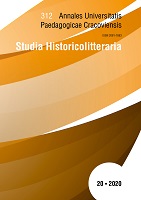Contrasto tra città e campagna nella Polonia rinascimentalesullo sfondo delle aspirazioni culturali degli ex-studenti e dei viaggiatori polacchi a Padova
A contrast between city and village in Renaissance Poland against the background of cultural aspirations of former students and Polish travellers in Padua
Author(s): Mirosław LenartSubject(s): Cultural history, Ethnohistory, Social history, Social Theory, Rural and urban sociology, Sociology of Culture, 16th Century
Published by: Wydawnictwo Uniwersytetu Komisji Edukacji Narodowej w Krakowie
Keywords: Polish Renaissance; Venetian villas; extra urban villas in Poland; Jan Kochanowski;
Summary/Abstract: A deep understanding of the contradiction between the world of culture, represented by the city, and nature, connected with village life, was captured in Titian’s fresco from 1511, illustrating the miracle of Saint Anthony, which takes place on the border of these two spaces. Such a sophisticated perception of this contrast, which is typical of Italian Renaissance, did not find its equivalent in Poland, where cities and court culture were less representative. Mass contact of Polish students, who arrived especially in Padua, with the culture of Venetian villas, during the Renaissance period, had an enormous impact on ideological attempts at reflecting humanistic models in literature, art and life, which developed in Italy. The paper presents numerous examples of such inspirations and points to their uniqueness, which consists in adapting Italian models to the reality in a different world of imagination and sensitivity.A deep understanding of the contradiction between the world of culture, represented by the city, and nature, connected with village life, was captured in Titian’s fresco from 1511, illustrating the miracle of Saint Anthony, which takes place on the border of these two spaces. Such a sophisticated perception of this contrast, which is typical of Italian Renaissance, did not find its equivalent in Poland, where cities and court culture were less representative. Mass contact of Polish students, who arrived especially in Padua, with the culture of Venetian villas, during the Renaissance period, had an enormous impact on ideological attempts at reflecting humanistic models in literature, art and life, which developed in Italy. The paper presents numerous examples of such inspirations and points to their uniqueness, which consists in adapting Italian models to the reality in a different world of imagination and sensitivity.
Journal: Annales Universitatis Paedagogicae Cracoviensis. Studia Historicolitteraria
- Issue Year: 2020
- Issue No: 20
- Page Range: 43-58
- Page Count: 16
- Language: Italian

